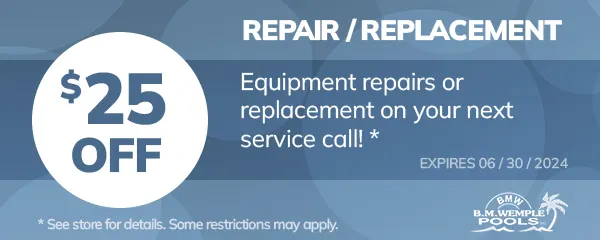Divine! That is what swimming on a warm summer afternoon feels like. But, your safety is important if you must enjoy your swimming pool as much as you want. This is why you should have your pool inspected regularly. Read on to know all the guidelines you should follow for a proper pool inspection.
What is Pool Inspection?
Pool Inspection is the act of following special guidelines to check and verify that your swimming pool is in the proper healthy conditions that guarantee safety when swimming. A certificate of compliance or non-compliance is usually issued after the inspection.
Pool inspection is a specialized duty and it's usually carried out by licensed pool inspectors. While a home inspector may have adequate knowledge of what pool inspection is about, you may still need to call a pool inspector especially to check out your pool.
When Should You Get a Pool Inspection?
Getting a pool inspection is necessary if you are offering your house for sale, if you are buying a new house or if you've been using the pool for at least a year.
If you are offering your house for sale, getting a pool inspection and fixing your pool to a perfect condition will immediately increase the value of the house you are putting for sale. While some people would pay for aesthetics, most people will pay more for aesthetics combined with functionality, safety and of course, peace of mind.
As a buyer, it is expected that you are excited about your new house. It's a plus that it came with a cool pool in the yard. However, you shouldn't forget to call a pool inspector to properly vet the pool and ensure its safety before you invest your money.
If you've been using the pool for a while, it is recommended that you inspect your pool at least once a year to ascertain its useability and safety all year round. If you notice or suspect any form of damage in or around the pool, you should call a pool inspector immediately.
You can get a pool inspection at any period during the year, however, it may be more difficult during the winter period due to the effect of the weather condition on the pool. However, this does not mean that an inspection can't be done.

Residential Pool Inspection Checklist You Need to Know
To get a proper pool inspection, you should have a residential pool inspection checklist to follow. This would ensure all the expected pool sections are properly checked.

1. Check for Safety
Nothing beats a beautiful, functional and safe pool in a home. The safety of the pool is so important that it is worth every dollar you spend on it. Here are some of the things to look out for when determining the safety of your pool.
- The electrical wires placement
Electrical wires must be placed far away or securely compacted away from the pool to avoid an electrocution accident.
- Check for slippery walkways
The walkways are an important part of the pool. It should be checked to ensure it wouldn't cause any accidental slip or trip.
- Fencing/Latching/Pool cover
The importance of these extra pool accessories is to keep unwanted people and pets out of the pool at a particular time. The categories of people that can be kept away include visitors or/and kids. With fencing, latching and pool cover you could ensure no kids would mistakenly enter the pool and face the risk of drowning.
You could also use the pool cover to pass a subconscious message to visitors that the pool is not in use at the moment. For all of these safety accessories to function properly, you should check if they are all still in good working condition.

2. The Interiors Wear and Tear
The pool interior to a large extent determines how hygienic the pool is for swimming. It also determines the quantity and quality of the water in the pool.
If the pool liner is leaking, the water will get reduced. So, it is important to check the pool liners for any form of tear that could cause a leak, and check the pool tiles or plaster. If any damage is found, it is advisable to repair immediately before it causes irreparable damage.
3. The Equipment Functionality
The pool won't work alone without some added equipment. Such equipment include pool pumps, pool filters, and pool lighting. All these accessories make the pool more fun to use and largely increase its functionality.
The Pool Pump
The function of the pool pump is to circulate the water in the pool through the filters and heater. It keeps the pool water sanitized and warm for use. It is an important piece of equipment in the pool and should be checked if it is functioning properly.
The Pool Filter
The filter as the name suggests filters away dirt from the pool and makes the pool water clean for use at all times. If you want to continue to enjoy hygienic, clean water in your pool, you should instruct your pool inspector to properly check the filter's functionality.

The Pool Lighting
Pool lighting is useful to create a light effect in and around the pool, especially at night. It could also be for aesthetic effects. The pool inspector should check if the light bulbs are all working or suggest the use of new bulbs.
Frequently Asked Questions
Here are some of the frequently asked questions.
- How Long Does a Pool Inspection last?
Residential pool inspection shouldn't take a lot of time. However, the number of hours it would take depends largely on how big the pool is and the number of equipment that has to be inspected. - Can I self-inspect my pool?
Yes, you can initially self-inspect your pool. But, you still need to call a pool inspector to properly inspect it and issue you the certificate of compliance. - I don't have children, does my pool need a safety barrier?
Every pool needs a safety barrier. Such as the pool fence and pool cover. This will prevent even neighboring kids from mistakenly wandering into the pool and risking drowning. - How Much Does a Pool Inspection Cost
How much a pool inspection would cost is dependent on several factors.- Location of the pool: If your house is in an elite environment or located in one of the hot states, where most homes have pools, you can be sure the cost would be pricier than if it is located elsewhere.
- The Size of the pool: The larger your pool, the more issues you may likely find. And the more the pool issues, the more your cost.
Nonetheless, the average cost of pool inspection ranges between $125 and $250.
Conclusion
A residential pool inspection is a must-have if you want to enjoy your pool thoroughly. It guarantees your safety and also saves you costs in the long run. You should get your pool inspected by licensed pool inspectors if you've not done so already. Get your certificate of compliance and enjoy a safe and pleasant swim anytime you want it.






